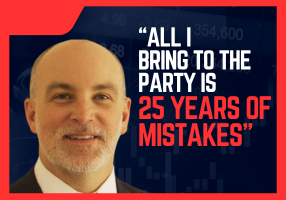Thomas Cole, “The Consummation of Empire” (1836)
Every vice of the Empire has bee
Foundation and Empire
To learn more about Epsilon Theory and be notified when we release new content sign up here. You’ll receive an email every week and your information will never be shared with anyone else.
Continue the discussion at the Epsilon Theory Forum
The Latest From Epsilon Theory
DISCLOSURES
This commentary is being provided to you as general information only and should not be taken as investment advice. The opinions expressed in these materials represent the personal views of the author(s). It is not investment research or a research recommendation, as it does not constitute substantive research or analysis. Any action that you take as a result of information contained in this document is ultimately your responsibility. Epsilon Theory will not accept liability for any loss or damage, including without limitation to any loss of profit, which may arise directly or indirectly from use of or reliance on such information. Consult your investment advisor before making any investment decisions. It must be noted, that no one can accurately predict the future of the market with certainty or guarantee future investment performance. Past performance is not a guarantee of future results. Statements in this communication are forward-looking statements. The forward-looking statements and other views expressed herein are as of the date of this publication. Actual future results or occurrences may differ significantly from those anticipated in any forward-looking statements, and there is no guarantee that any predictions will come to pass. The views expressed herein are subject to change at any time, due to numerous market and other factors. Epsilon Theory disclaims any obligation to update publicly or revise any forward-looking statements or views expressed herein. This information is neither an offer to sell nor a solicitation of any offer to buy any securities. This commentary has been prepared without regard to the individual financial circumstances and objectives of persons who receive it. Epsilon Theory recommends that investors independently evaluate particular investments and strategies, and encourages investors to seek the advice of a financial advisor. The appropriateness of a particular investment or strategy will depend on an investor’s individual circumstances and objectives.
This commentary is being provided to you as general information only and should not be taken as investment advice. The opinions expressed in these materials represent the personal views of the author(s). It is not investment research or a research recommendation, as it does not constitute substantive research or analysis. Any action that you take as a result of information contained in this document is ultimately your responsibility. Epsilon Theory will not accept liability for any loss or damage, including without limitation to any loss of profit, which may arise directly or indirectly from use of or reliance on such information. Consult your investment advisor before making any investment decisions. It must be noted, that no one can accurately predict the future of the market with certainty or guarantee future investment performance. Past performance is not a guarantee of future results. Statements in this communication are forward-looking statements. The forward-looking statements and other views expressed herein are as of the date of this publication. Actual future results or occurrences may differ significantly from those anticipated in any forward-looking statements, and there is no guarantee that any predictions will come to pass. The views expressed herein are subject to change at any time, due to numerous market and other factors. Epsilon Theory disclaims any obligation to update publicly or revise any forward-looking statements or views expressed herein. This information is neither an offer to sell nor a solicitation of any offer to buy any securities. This commentary has been prepared without regard to the individual financial circumstances and objectives of persons who receive it. Epsilon Theory recommends that investors independently evaluate particular investments and strategies, and encourages investors to seek the advice of a financial advisor. The appropriateness of a particular investment or strategy will depend on an investor’s individual circumstances and objectives.










This is a compelling analysis, Ben, but I don’t see how the U.S. is going extract a significant amount of additional rent from the rest of world before November, 2020. Maybe you see it differently, but the capacity of both China and the E.U. to resist a mercantilist tilt by the U.S. looks robust to me – at least in the near term.
Ben, I don’t understand. The U.S. has yearly trade deficits in the billions with S. Korea, Saudi Arabia, and Russia (and next to no trade with Iran). Without getting into whether there’s any likelihood that Trump & Co. will be successful, I’m having trouble seeing how attempting to reduce those deficits is mercantilist. I guess maybe directionally mercantilist?
I’d submit that gently and not so gently forcing the rest of the world over the last 50+ years to accept a system where we print little pieces of paper (or the electronic equivalent), and then get goodies from all over the world in trade for that paper, looks an awful lot like something an empire would have done back in the bad old days.
What has happened in the oil market these past few months is a near perfect example of a rent seeking policy.
Trump announces strict sanctions on Iranian oil exports to be enforced starting in November. Then he puts pressure on the Saudis to increase production to make up for the Iranian shortfall. The Saudis comply. November rolls around and suddenly there are waivers granted to all of Iran’s best customers to continue to buy Iranian oil. The price of crude collapses and Trump takes credit for the resulting drop in gasoline prices. He is convinced low oil prices make America richer. Even though the US is now the world’s biggest oil producer, the folks who produce the stuff are far fewer than the consumers(voters) who buy it.
Seems like this chart should be on a log scale…
the alternative to the blue line dropping is it staying stagnant while the yellow line catches up. thoughts on probabilities?
I really like the chart, the pics, and the analysis - and anyone who can work in Asimov’s “Foundation” gets a gold star from me. But a serious question: Look closely at those graphs. There are two inflection points on the yellow graph that are being ignored. The curve goes from concave (curved upward, meaning increasing growth) to convex - and it looks like it occurs over the course of the 1980’s. It also appears to get more convex (worse) over the course of the 90’s. As two comments already note:
(1) how is reducing our massive trade imbalance with a lot of these countries “mercantilist?” i.e. Many of these countries have favored industries and they protect them with tariffs. In a (hypothetical) zero tariff world, our yellow curve would have to be higher all along, which makes sense when you consider what the US has actually added to the world in terms of inventions (start with electricity, for example, and work your way forward to the automobile and the internet.) Have we gotten anywhere near full return for what we invested from the rest of the world?
(2) The EU (and Japan) have benefitted tremendously from not having to pay for their own self-defense. Have we, too? Sure. But the EU hasn’t even paid (ever!) what it promised under NATO, all while sneering at the US and telling us what unsophisticated savages and brutes we are. (Not to mention in some cases, denying us use of their airspace, undercutting us diplomatically, etc.)
I’d like to see us involved in a lot less of these idiotic (Iraq), interminable (War on a Tactic), military adventures overseas, and I wonder to what extent these graphs would look different if some of those things were factored into them.
And, finally, even if this analysis is all completely correct, given what I’ve noted above, to what extent might this rent extraction be economically justifiable and correct the yellow curve upward?